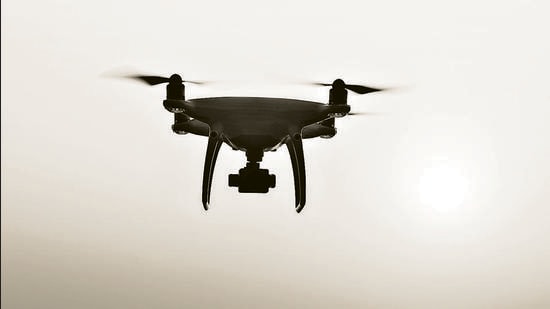Govt notifies liberalised drone rules to replace unmanned aircraft norms
According to the new rules, special drone corridors will be developed for cargo deliveries. Several approvals have also been abolished. They include unique authorisation number, unique prototype identification number, certificate of manufacturing and airworthiness, etc
The civil aviation ministry on Thursday notified the liberalised Drone Rules, 2021, that replace the Unmanned Aircraft System Rules (UAS), 2021, which came into force in March. The new rules are aimed at making it significantly easier for people and companies to own and operate drones. They also streamline a labyrinthine certification process for manufacturers, importers and users.

“India has the potential to be a global drone hub by 2030 as drones offer tremendous benefits to all sectors of the economy and can be significant creators of employment and economic growth due to their reach, versatility, and ease of use,” the ministry said on Thursday.
Also Read | BSF opens fire at drone in Jammu’s Arnia sector
According to the new rules, special drone corridors will be developed for cargo deliveries. Several approvals have also been abolished. They include unique authorisation number, unique prototype identification number, certificate of manufacturing and airworthiness, certificate of conformance, certificate of maintenance, import clearance, acceptance of existing drones, operator permits, authorisation of R&D organisation, student remote pilot licence, remote pilot instructor authorisation, drone port authorisation etc.
Building on its attempt to make rules easier, the new rules say no pilot licence will be required for micro drones (for non-commercial use), nano drones and for R&D organisations. There will no longer be a ban on the use of drones by foreign-owned companies registered in India. No security clearance will be required before any registration or licence is issued.
The government plans to open what is known as the Digital Sky platform, which manufacturers will be able to use for the certification process, and from where interactive airspace maps with green, yellow, and red zones can be accessed.
Digital Sky will also serve as a unified platform for users to obtain the mandatory registration number and remote pilot license. People will need to check the service to determine if any restrictions are in place before they fly a drone at a location. The platform will be under India’s aviation regulator, the Directorate General of Civil Aviation.
Drones have been under the spotlight since such a device was used to target an Indian Air Force base in Jammu with explosives in June. Officials have since said they are working on anti-drone technologies. Typical consumer drones usually have some inbuilt safeguards, which mean not all are unsafe.
Drones now form a significant new consumer tech category, particularly among hobbyists and visual artists, and are being tested for a range of practical as well as industrial uses such as automated package deliveries by e-commerce companies.
In March, the civil aviation ministry published the UAS Rules, 2021. “They were perceived by academia, Startups, end-users and other stakeholders as being restrictive in nature as they involved considerable paperwork, required permissions for every drone flight and very few ‘free to fly’ green zones were available. Based on the feedback, the Government has decided to repeal the UAS Rules, 2021 and replace the same with the liberalised Drone Rules, 2021,” the aviation ministry said.
“Unmanned Aircraft Systems (UAS), commonly known as drones, offer tremendous benefits to almost all sectors of the economy like – agriculture, mining, infrastructure, surveillance, emergency response, transportation, geo-spatial mapping, defence, and law enforcement etc,” the ministry said.
Drones can be significant creators of employment and economic growth due to their reach, versatility, and ease of use, especially in India’s remote and inaccessible areas, the ministry noted. “In view of its traditional strengths in innovation, information technology, frugal engineering and huge domestic demand. India has the potential to be global drone hub by 2030,” it said.





